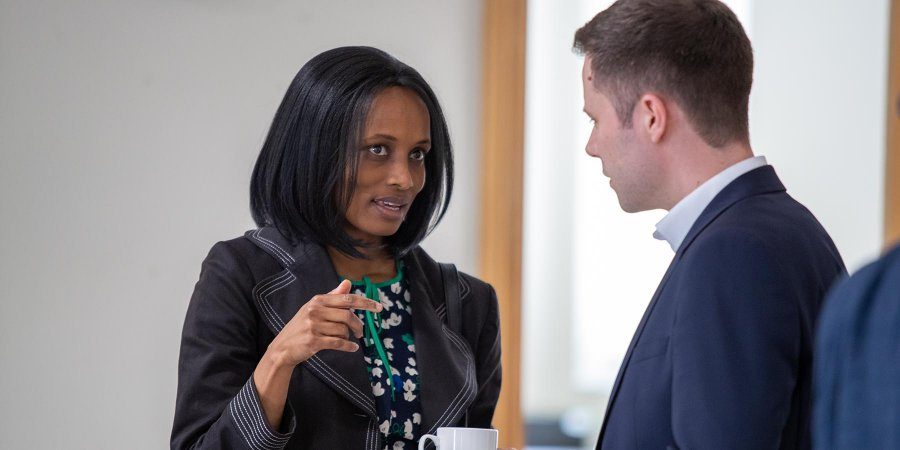An introduction to what the University is doing to defend equality and foster inclusion
Alumni, students and staff have expressed concerns following recent events in the USA and the inequalities highlighted by the global antiracism movement, Black Lives Matter. Members of our community want to know what the University is doing to address racism at Cambridge. Our work on race equality is ongoing and comprises a range of initiatives to address inequalities and challenge racism at both institutional and individual levels.
Recent events
With the rest of the world, Cambridge has watched recent events unfold in the USA. Two statements published in early June, from the Vice-Chancellor, Professor Stephen J Toope, and from the Black, Asian and Minority Ethnic (BAME) staff network, expressed outrage, sadness and frustration at ongoing racial injustice and resolve to continue working on addressing it within the University and beyond.
Universities stand for shared opportunity and a fundamental commitment to the creation of knowledge across all barriers of race, language, culture and background. The Vice-Chancellor wrote: “In the face of intolerance and historically entrenched racism, our community must strive to represent the alternative: openness to all with respectful engagement across our differences. We do not always live up to these aspirations.” We recognise that much work is needed to tackle race inequalities at the University. Work to address racism at the University is ongoing and must not be another burden on BAME individuals.
As the Vice-Chancellor wrote in his 2018 blog post: “Pushing back against inequality should not only be the responsibility of those who are most affected by it. It is a responsibility for all of us. Equality and diversity must become deeply and irreversibly embedded in the University’s core work – whether it is education, research or administration.”
Here are some of the initiatives worked on by and available to staff and students.
Race Equality Charter
The University joined Advance HE’s Race Equality Charter (REC) in 2016 and received the REC Bronze award in November 2019.
The REC is a national scheme that provides a framework for higher education institutions to recognise, investigate and challenge barriers to recruitment, progression and retention of Black, Asian and Minority Ethnic staff and students.
The work on REC and the institutional action plan to address racial inequalities at the University is coordinated by a self-assessment team chaired by the Pro-Vice-Chancellor for Institutional and International Relations, Professor Eilís Ferran, and Dr Mónica Moreno Figueroa, one of the University’s two Race Equality and Inclusion Champions.
Initiatives from the institutional action plan are publicised on the dedicated website. The aim is “to improve racial equality at the University by driving cultural and organisational change to ensure that we excel in attracting and supporting Black, Asian and Minority Ethnic staff and students, while creating an environment that is conducive to openly discussing race-related issues and challenging racism”.

Admissions
In October 2019, the University welcomed a record 91 black undergraduates, which represented a 50% rise on the previous year. There is no doubt the publicity given to the Stormzy Scholarships has been a major factor in encouraging more black students to study at Cambridge. The award-winning grime artist announced in 2018 that he would pay the tuition fees and maintenance costs of four students over two years, for up to four years of study. But there has also been a concerted attempt to increase targeted outreach work. The University has strengthened its partnership with Target Oxbridge, which works closely with black students in schools to encourage more of them to apply to Cambridge and Oxford. And in 2019 the University produced a series of films for social media aimed at challenging myths about the Cambridge experience. Credit must also be given to the University’s African-Caribbean Society. Members of ACS have given up their time to host access events, act as mentors, and attend College outreach activities providing inspiration for a new generation of students.
While we recognise the increase in the diversity of the student body is positive, we also acknowledge that admissions is only one strand of work to tackle racial inequality at the University and that creating supportive and safe conditions, free from racism and harassment, is a priority.
Support for staff and students
Our staff and student surveys show that many BAME staff and students face racism whilst at the University on a daily basis. We are aware of the magnitude of the problem and are working on improving our support services. Existing support options include the BAME staff network, training and development, and reporting structures.
Students have developed their own support through the Cambridge University Students Union (CUSU) BME campaign. The student counselling service enables BAME students to request a BAME counsellor, the introduction of which CUSU was instrumental in.
Wider initiatives
Students in recent years have fed back to their faculties and departments on the nature of their curriculum. Last year, CAM 88 (Michaelmas Term, 2019) covered calls to decolonise the curriculum in the article How to be modern. The portrait exhibition, The History Makers: Black Cantabs, first shown at the UL in Michaelmas Term 2018, arose from a project undertaken by students in the Black Cantabs Research Society, to spotlight black students through history.
The history of the University is being further examined by the Legacies of Enslavement project, which was created in early 2019 at the request of the Vice-Chancellor, following public interest in the issue of British universities’ historical links to the slave trade. It has been asked to advise him on the University’s historical links with the slave trade and to propose future action in light of this. The project’s advisory group has issued an initial report and is due to produce its final report in 2022.
To find out more about the University’s approach, please visit our website.



